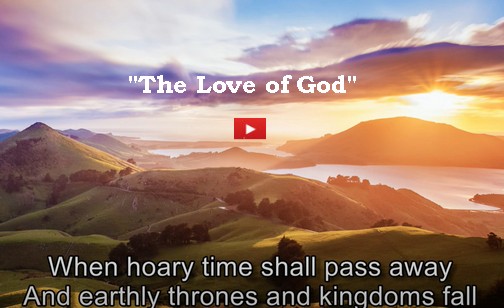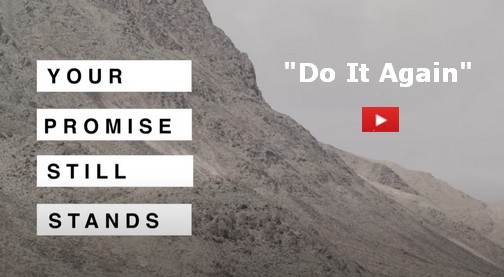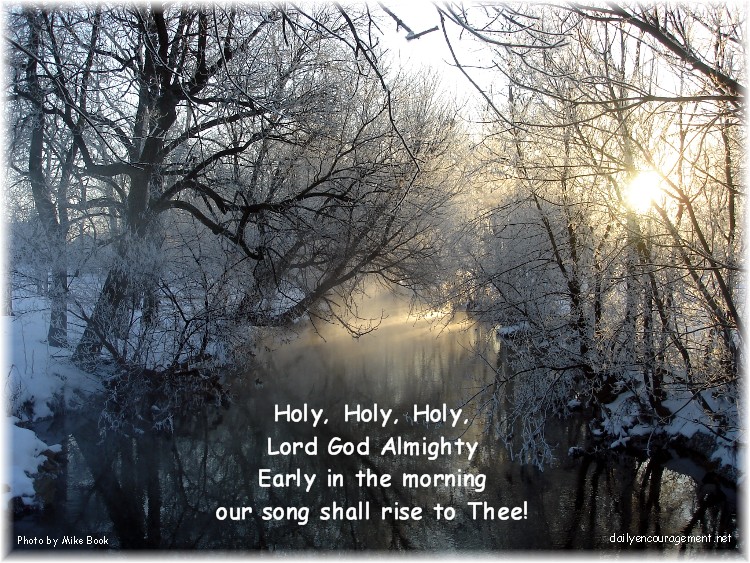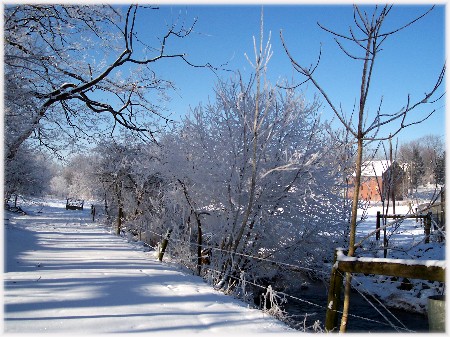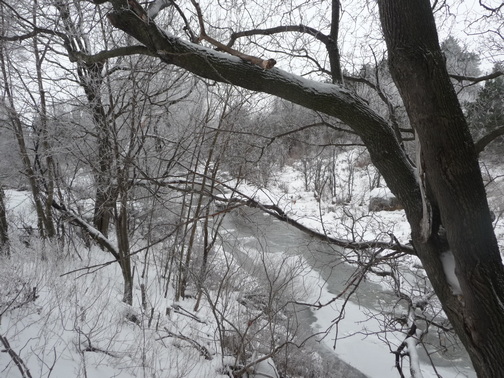A
daily, Bible-based perspective of hope, encouragement and
exhortation.
Monday,
January 11,
2021
Hoar frost in
northern New York
Photo by Jeff
Worrall
"God's Love,
So Sure, Shall Still Endure"
Message summary: All
through history earthly thrones and kingdoms have
risen and fallen. Most of us have not lived through
the rise and fall of a nation but some have, such as
our readers we hear from in Africa. We may feel
entitled that it could never happen where we live or
at least in our lifetime. But history has a tendency
to repeat itself. So, in light of earthly thrones
and kingdoms falling where should our focus be?
 Listen
to this message on your audio player.
Listen
to this message on your audio player.
 Listen
to this message on your audio player.
Listen
to this message on your audio player."For
God so loved the world, that He gave His only
begotten Son, that whosoever believeth in Him
should not perish, but have everlasting life"
(John 3:16). "And I pray that you, being rooted
and established in love, may have power, together
with all the Lord’s holy people, to grasp how wide
and long and high and deep is the love of Christ,
and to know this love that surpasses
knowledge—that you may be filled to the measure of
all the fullness of God" (Ephesians 3:17-19).
Jeff
is a friend we've known since the early 1980's
who, along with his wife and family, now live in
northern New York state, not far from the Saint
Lawrence Seaway and Canadian border. As
you might expect that
area has a rather long, cold winter. Several years
ago we visited them and drove through a lake
affect blizzard to get there.
I
called Jeff and his wife Lois a couple of days ago
and he shared some photos he had taken of the hoar
frost such as seen in our lead photo.
"Hoar" (the correct spelling is very important in this case) frost is similar to dew and happens on cold and clear nights when water vapor (which is a gas) freezes onto a below-freezing surface. Because of this process, it actually skips the liquid phase in the deposition process. It makes for some beautiful scenery, probably even more stunning when the sun rises and the ice crystals have a glistening appearance.
The definition of hoary from Merriam Webster is:
The Bible uses the word "hoary" several times (in older versions).
One verse describes the same type of frost that Jeff saw: "And the hoary frost of heaven, who hath engendered it?" (Job 38:29).
Others describe the aged: "Thou shalt rise up before the hoary head, and honour the face of the old man, and fear thy God: I am the Lord" (Leviticus 19:32). "The hoary head is a crown of glory, if it be found in the way of righteousness" (Proverbs 16:31).
I recalled singing the word "hoary" in a hymn but couldn't recall which one. While preparing this message I walked upstairs to ask Brooksyne if she recalled singing the word in a hymn and without hesitation she answered, "The Love of God".
"Hoar" (the correct spelling is very important in this case) frost is similar to dew and happens on cold and clear nights when water vapor (which is a gas) freezes onto a below-freezing surface. Because of this process, it actually skips the liquid phase in the deposition process. It makes for some beautiful scenery, probably even more stunning when the sun rises and the ice crystals have a glistening appearance.
The definition of hoary from Merriam Webster is:
1.
gray or white with or as if with age bowed his
hoary head
2. extremely old, ANCIENT
2. extremely old, ANCIENT
The Bible uses the word "hoary" several times (in older versions).
One verse describes the same type of frost that Jeff saw: "And the hoary frost of heaven, who hath engendered it?" (Job 38:29).
Others describe the aged: "Thou shalt rise up before the hoary head, and honour the face of the old man, and fear thy God: I am the Lord" (Leviticus 19:32). "The hoary head is a crown of glory, if it be found in the way of righteousness" (Proverbs 16:31).
I recalled singing the word "hoary" in a hymn but couldn't recall which one. While preparing this message I walked upstairs to ask Brooksyne if she recalled singing the word in a hymn and without hesitation she answered, "The Love of God".
The
second verse of the great hymn starts: "When hoary
time shall pass away, and earthly thrones and
kingdoms fall". What
does "hoary time" mean? Some hymnals change this
to "When years of time shall pass away" which
catches the sense because most of us don't use
"hoary" in our vocabulary (actually do any of
us?). It wouldn't work rhythmically for the hymn,
but a better sense would be "When long, long
years of time shall pass away".
When
I consider the conditions in our country and
throughout the world today this sure gets my
attention! All through history earthly thrones and
kingdoms have risen and fallen. Most of us have
not lived through the rise and fall of a nation
but some have, such as our readers we hear from in
Africa.
We
may feel entitled that it could never happen where
we live or at least in our lifetime. But history
has a tendency to repeat itself.
So, in light of earthly thrones and kingdoms falling where should our focus be? The chorus responds:
God’s
love, so sure, shall still endure,
All measureless and strong;
Redeeming grace to Adam’s race—
The saints’ and angels’ song.
All measureless and strong;
Redeeming grace to Adam’s race—
The saints’ and angels’ song.
Can
I get a Hallelujah!
Be encouraged!
Stephen & Brooksyne Weber
Stephen & Brooksyne Weber
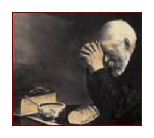 Daily
prayer: Merciful
Father, life's journey is filled with obstacles
that tend to disrupt and potentially block the
light You provide to those who of us who reside in
a darkened, sin-filled world. We prefer peace,
joy, and love to accompany our every move and yet
we have to shuffle through the litter of sin and
decay daily because we're not home yet. Remind us
that though we presently reside in our fallen
earthly kingdom, our permanent citizenship is
secured in Your heavenly kingdom where there will
be no end, where You will rule with justice and
righteousness forevermore. Keep us steady until
that event occurs. In the name of Jesus, Amen.
Daily
prayer: Merciful
Father, life's journey is filled with obstacles
that tend to disrupt and potentially block the
light You provide to those who of us who reside in
a darkened, sin-filled world. We prefer peace,
joy, and love to accompany our every move and yet
we have to shuffle through the litter of sin and
decay daily because we're not home yet. Remind us
that though we presently reside in our fallen
earthly kingdom, our permanent citizenship is
secured in Your heavenly kingdom where there will
be no end, where You will rule with justice and
righteousness forevermore. Keep us steady until
that event occurs. In the name of Jesus, Amen.Today's
Suggested Music and Supplemental
Resources
"The
Love of God" Video
"Royal
Telephone" Video Jimmy
Little - As I (Brooksyne)
was studying the hymn background to "The
Love of God" written by F.M. Lehman I
read that he also wrote "The Royal
Telephone". It's not full of rich
theology like "The Love of God" but is
more a fun type of gospel song based on
the wonder of a new-fangled invention
that swept over America in the early
1900's. For the old-timers (which I now
count myself among them) this was a
popular and fun song to sing in the 60's
and we sang it often when I was a child
in our little church, always accompanied
by hand clapping. You might enjoy the
photos posted that also reminisce of an
era goneby as well as the music
accompaniment.
"Do
It Again" Video
"Your
promise still stands, great is your
faithfulness"
We
need some humor in these troubling times
since "A merry heart doeth good like
medicine". Jackline, a reader from South
Sudan sent this one:
A
rabbit entered a shop and asked: "Do you
have carrots?". They said "No, we
don't." The following day the rabbit
came to the shop and asked again, "Do
you have carrots?"
They replied angrily, "We said we don't have carrots. If you come back asking, we're gonna put a nail in your head with a hammer!"
The third day the rabbit came back and yet asked, "Do you have a hammer? They replied "NO". He said "What about nails?" They said "NO". Then he calmly asked, "Do you have carrots?"
They replied angrily, "We said we don't have carrots. If you come back asking, we're gonna put a nail in your head with a hammer!"
The third day the rabbit came back and yet asked, "Do you have a hammer? They replied "NO". He said "What about nails?" They said "NO". Then he calmly asked, "Do you have carrots?"
(Brooksyne's
note: If you didn't get it first
time around, read it again slowly. Ester
and I got the humor second time around
and it is cute. I can almost see this
played out on "Bugs Bunny" a cartoon I
watched faithfully as a young child.)
For further
study:
Sociologists
and anthropologists have described the
stages of the rise and fall of the world’s
great civilizations. Scottish philosopher
Alexander Tytler (1747–1813) of the
University of Edinburg noted eight stages
that articulate well what history discloses.
Although formulated over 200 years ago they
provide a great deal of perspective to what
we are currently experiencing.
Let’s look at each of the eight stages. The names of the stages are from Tyler’s book and are presented in bold text. The brief observations are by Charles Pope.
From bondage to spiritual growth – Great civilizations are formed in the crucible. The Ancient Jews were in bondage for 400 years in Egypt. The Christian faith and the Church came out of 300 years of persecution. Western Christendom emerged from the chaotic conflicts during the decline of the Roman Empire and the movements of often fierce “barbarian” tribes. American culture was formed by the injustices that grew in colonial times. Sufferings and injustices cause—even force—spiritual growth. Suffering brings wisdom and demands a spiritual discipline that seeks justice and solutions.
Let’s look at each of the eight stages. The names of the stages are from Tyler’s book and are presented in bold text. The brief observations are by Charles Pope.
From bondage to spiritual growth – Great civilizations are formed in the crucible. The Ancient Jews were in bondage for 400 years in Egypt. The Christian faith and the Church came out of 300 years of persecution. Western Christendom emerged from the chaotic conflicts during the decline of the Roman Empire and the movements of often fierce “barbarian” tribes. American culture was formed by the injustices that grew in colonial times. Sufferings and injustices cause—even force—spiritual growth. Suffering brings wisdom and demands a spiritual discipline that seeks justice and solutions.
From
spiritual growth to great courage –
Having been steeled in the crucible of
suffering, courage and the ability to endure
great sacrifice come forth. Anointed leaders
emerge and people are summoned to courage
and sacrifice (including loss of life) in
order to create a better, more just world
for succeeding generations. People who have
little or nothing, also have little or
nothing to lose and are often more willing
to live for something more important than
themselves and their own pleasure. A battle
is begun, a battle requiring courage,
discipline, and other virtues.
From
courage to liberty – As a result of
the courageous fight, the foe is vanquished
and liberty and greater justice emerges. At
this point a civilization comes forth,
rooted in its greatest ideals. Many who led
the battle are still alive, and the legacy
of those who are not is still fresh. Heroism
and the virtues that brought about liberty
are still esteemed. The ideals that were
struggled for during the years in the
crucible are still largely agreed upon.
From
liberty to abundance – Liberty ushers
in greater prosperity, because a
civilization is still functioning with the
virtues of sacrifice and hard work. But then
comes the first danger: abundance. Things
that are in too great an abundance tend to
weigh us down and take on a life of their
own. At the same time, the struggles that
engender wisdom and steel the soul to proper
discipline and priorities move to the
background. Jesus said that man’s life does
not consist in his possessions. But just try
to tell that to people in a culture that
starts to experience abundance. Such a
culture is living on the fumes of earlier
sacrifices; its people become less and less
willing to make such sacrifices. Ideals
diminish in importance and abundance weighs
down the souls of the citizens. The
sacrifices, discipline, and virtues
responsible for the thriving of the
civilization are increasingly remote from
the collective conscience; the enjoyment of
their fruits becomes the focus.
From
abundance to complacency – To be
complacent means to be self-satisfied and
increasingly unaware of serious trends that
undermine health and the ability to thrive.
Everything looks fine, so it must be fine.
Yet foundations, resources, infrastructures,
and necessary virtues are all crumbling. As
virtues, disciplines, and ideals become ever
more remote, those who raise alarms are
labeled by the complacent as “killjoys” and
considered extreme, harsh, or judgmental.
From
complacency to apathy – The word
apathy comes from the Greek and refers to a
lack of interest in, or passion for, the
things that once animated and inspired. Due
to the complacency of the previous stage,
the growing lack of attention to disturbing
trends advances to outright dismissal. Many
seldom think or care about the sacrifices of
previous generations and lose a sense that
they must work for and contribute to the
common good. “Civilization” suffers the
serious blow of being replaced by
personalization and privatization in growing
degrees. Working and sacrificing for others
becomes more remote. Growing numbers
becoming increasingly willing to live on the
carcass of previous sacrifices. They park on
someone else’s dime, but will not fill the
parking meter themselves. Hard work and
self-discipline continue to erode.
From
apathy to dependence – Increasing
numbers of people lack the virtues and zeal
necessary to work and contribute. The
suffering and the sacrifices that built the
culture are now a distant memory. As
discipline and work increasingly seem “too
hard,” dependence grows. The collective
culture now tips in the direction of
dependence. Suffering of any sort seems
intolerable. But virtue is not seen as the
solution. Having lived on the sacrifices of
others for years, the civilization now
insists that “others” must solve their woes.
This ushers in growing demands for
governmental, collective solutions. This in
turns deepens dependence, as solutions move
from personal virtue and local, family-based
sacrifices to centralized ones.
From
dependence back to bondage – As
dependence increases, so does centralized
power. Dependent people tend to become
increasingly dysfunctional and desperate.
Seeking a savior, they look to strong
central leadership. But centralized power
corrupts, and tends to usher in increasing
intrusion by centralized power. Injustice
and intrusion multiplies. But those in
bondage know of no other solutions. Family
and personal virtue (essential ingredients
for any civilization) are now effectively
replaced by an increasingly dark and
despotic centralized control, hungry for
more and more power. In this way, the
civilization is gradually ended, because
people in bondage no longer have the virtues
necessary to fight. Another possibility is
that a more powerful nation or group is able
to enter, by invasion or replacement, and
destroy the final vestiges of a decadent
civilization and replace it with their own
culture.

To receive the
"Daily Encouragement" each Monday-Friday
through email see this
page to subscribe to our email list. You can also
subscribe to the Wordpress rss feed or
through a Wordpress email subscription.
(See the email subscription on the right side
after opening this page)
Permissions:
Please feel free to pass on, reproduce and
distribute any material on Daily Encouragement
Net, in part or in whole, in any format,
provided that you do not alter the wording in
any way or charge a fee beyond the cost of
reproduction. It is our desire to spread this
material, not protect or restrict it. We do
request that you keep the contact, copyright and subscription
information intact.
We want to thank all who financially
support our ministry. We
realize there are many fine ministries and
causes requesting support but if the Lord
would lead you we surely need and appreciate
the financial support from our readers and
listeners. Our
ministry labor is comprised of approximately
half our time to Daily Encouragement and the
other half to our chaplaincy ministry to
companies for which we receive compensation.
Each of these ministries essentially is the
same as a part-time job (20+ hours weekly) for
each of us. Our goal for many years is that
each would provide half of our ministry
expenses and income.
If you would consider making a donation to our ministry see here for more information.
To donate directly online here. This will open to a page that designates the offering to: WEBER,STEPHEN CHAP, Specialized Chaplaincy Ministry ID: 700001-237376
If you would consider making a donation to our ministry see here for more information.
To donate directly online here. This will open to a page that designates the offering to: WEBER,STEPHEN CHAP, Specialized Chaplaincy Ministry ID: 700001-237376
 Please Note: We
also provide this easy option due to the
convenience, for international supporters,
and for those who may not be concerned
regarding receiving an official tax
deductible receipt. Click here to
send an offering using PayPal. This
will open to a page that states "Brooksyne
Weber".
Please Note: We
also provide this easy option due to the
convenience, for international supporters,
and for those who may not be concerned
regarding receiving an official tax
deductible receipt. Click here to
send an offering using PayPal. This
will open to a page that states "Brooksyne
Weber".Scripture references are from The Holy Bible: New International Version. © 1984 by International Bible Society; NEW AMERICAN STANDARD BIBLE®, Copyright © 1995 by The Lockman Foundation, New King James Version (NKJV) Copyright © 1982 by Thomas Nelson, Inc. and the King James Version.
Personal Mission Statement: "I am created by God to bring Him glory. Through God's Son Jesus Christ I have been redeemed and make it my life's goal to please the Lord. My mission in life is to honor God through my faith and obedience and prepare myself and all whom I may influence for eternity."
© Copyright 2021 Stephen C. & Brooksyne
Weber - All Rights Reserved
Daily Encouragement Net - 495 Kraybill Church Road - Mount Joy, PA 17552 USA
Daily Encouragement Net - 495 Kraybill Church Road - Mount Joy, PA 17552 USA




